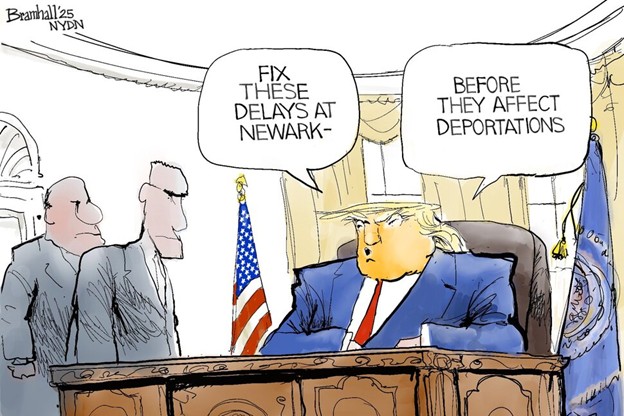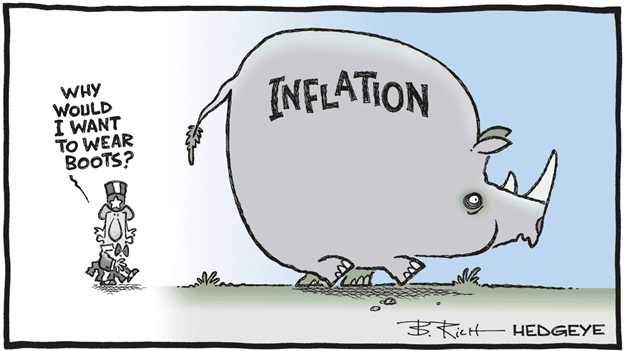
22 Nov The Seeds of Economic Decline
“Populist policymaking can be extraordinarily destructive.” – The Lonely Realist
Both Republican MAGAism and Democratic Party Progressivism have found sizable voter bases among “ordinary people who feel that their concerns have been disregarded by established elites” – an exercise in populism that today has found favor with social media and politicians. Populist policymaking, however, has fewer fans among economists. Although populism can be perceived as successful in the short-term, it more often has nasty long-term economic consequences. The Republican Party, the political party currently in power, nevertheless is intent on executing its “America First” version of populism. It is doing so in part by closing America’s borders to new immigrants (at least those without a “gold card”), actively expelling illegal immigrants, significantly reducing the issuance of student visas, cutting Federal funding for university research, and curtailing H-1B visas (that allow employers to hire foreign workers in specialty occupations). “America First” populist policymaking also means that free trade and globalization have been abandoned in favor of protectionism, onshoring and Federal government management (and funding) of national champions…, none of which previously was a component of American capitalism. Finally, MAGA is pressing for a benchmark interest rate of 1% and devaluation of the Dollar and is spending trillions of Dollars amassing annual deficits, all in reliance on Modern Monetary Theory. These are not the policy prescriptions of fiscal conservative Republicanism and are not a formula for long-term increases in GDP growth and enhanced international economic and geopolitical competitiveness.
Immigrants comprise ~70% of American farmworkers of which perhaps half are illegals (undocumented aliens). The Trump Administration’s policies are designed to significantly reduce America’s immigrant population through threatened enforcement (which has the effect of disrupting immigrant-intensive business operations) and by deporting >10 million illegal immigrants. Its actions are producing labor shortages in job categories that are otherwise unattractive to unemployed “non-immigrant Americans” who do not already reside in the farm and factory towns where those jobs exist. California, a primary target of anti-immigrant action, relies on immigrants to produce over half of America’s fruits, vegetables and nuts and enforcement disruptions unsurprisingly already have led to labor shortages and price increases. Similar consequences are apparent in the meat-packing, dairy-processing, and produce-preparation industries where immigrant enforcement actions have slowed production and reduced capacity. The same is true in certain areas of manufacturing where ~20% of jobs are filled by immigrants, some of whom are illegals and all of whom now are subject to enhanced scrutiny. Although President Trump understands that wide-spread enforcement can be economically counterproductive and briefly considered pausing anti-immigrant enforcement after being lobbied by agricultural and manufacturing interests, he nevertheless has determined to fulfill his anti-immigration campaign promise. The Trump Administration accepts that its “America First” immigration policy will create labor shortages. Businesses will be required to raise wages and attract “native American” workers and those costs will be passed on to consumers. The Administration believes that the effect will be transitory. Economists disagree. As the enforcement process continues, its impact will snowball. Arrests, economic contraction and resulting layoffs will make an increasing number of businesses economically unviable with consequences ultimately impacting the entire economy.
The MAGA focus on prioritizing “native” opportunities has extended to university degrees, where visas for foreign university applicants are being severely curtailed. Throughout the 20th and early 21st Centuries, international students were a mainstay of American research in STEM disciplines (science, technology, engineering and mathematics). They most recently have comprised ~80% of graduate students in engineering and >60% in computer science – which the new visa policy immediately reduced by ~17% (noting also that international students contribute ~$40 billion annually to the U.S. economy through tuition and living expenses). (Those who have been thwarted in their American visa efforts are finding opportunities in other countries…, where the “red carpet” has been rolled out…, and for good reason.) Over time, these reductions will impact university research output and success – another “snowball effect.” A sufficient number of “native Americans” do not have the same interests in STEM studies, which is why American universities and research institutions have been dependent on international talent for staffing…, a significant factor in fueling American research exceptionalism and technological outperformance. Coupled with reduced Federal funding for universities and for university research grants and the higher hurdle for obtaining H-1B visas, the Administration’s “America First” policies are not in America’s long-term economic interest (as President Trump recently acknowledged).
The case for global free trade is just as clear…, and equally unpopular with MAGA supporters. Deglobalization and onshoring therefore will continue to be American priorities and will do damage to America’s economy and competitiveness. An economic axiom is that free trade maximizes efficiency whereby countries specialize in producing those goods with respect to which they hold relative cost advantages, enabling free traders to efficiently consume more than they could produce independently. This generates consumer benefits through lower prices and product variety. Global supply chains enabled by free trade allow companies to optimize production across geographic locations, reducing costs and enabling innovations that wouldn’t be economically viable with purely domestic production. While it also is true that national security concerns justify the onshoring of critical industries, such as semiconductors and rare earths, the policy of attempting to bring a broad range of mining, manufacturing and production capacity within America’s borders, even if physically possible and economically rational, would take many years…, and would face high hurdles from NIMBYism, local permitting requirements, and legal challenges. Reciprocal trade relationships are and should be mutually beneficial, which once again argues in favor of economics over populism.
Rather than protecting American jobs and industries, populist policies ultimately harm them. They reduce American competitiveness and cede technological leadership to nations with more open talent policies, larger STEM populations, and better-targeted research funding. America achieved economic preeminence by attracting the world’s best minds, funding research and education, and encouraging businesses to minimize labor and manufacturing costs. Ending that openness reverses the dynamics. Rather than strengthening domestic production, anti-immigration and onshoring policies undermine industries where America has competitive advantages. Policies intended to protect American jobs and companies thereby eliminate both by making businesses less viable. The continued pursuit of populist “America First” policies not only is adding increased economic costs, but also will stoke inflation. Those policies accordingly are sowing the seeds of American economic decline.
Finally (from a good friend)






No Comments